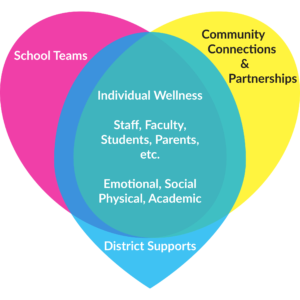If you are concerned about an individual in crisis or who is suicidal, please refer to the links on the sidebar.
Critical concepts for all school-based employees to recognize, respond, and report when students need support.
Visit Utah's resource page called Live On Utah.
You are invited to listen to our Superintendent's Podcast on Suicide Prevention which includes tips and ideas for talking to students who may be suicidal. Please review the suggestions below and watch the short video above.
For free training from Intermountain Healthcare on Suicide Awareness, follow this link.
Jordan School District prioritizes suicide prevention and works with several community partners to prevent suicide in our communities. The Jordan School District has partnered with Hope4Utah in taking steps to provide community-wide education and prevention resources.

Jordan School District's Health and Wellness Team has created the following diagram to represent our approach to promoting individual wellness and suicide prevention. The three components – school teams, community connections & partnerships, and district supports – all work together to support each individual. The three components wrap individuals in a heart shape as a symbol of the necessity of caring and connection for each individual's wellbeing. We believe that our schools are one source of caring and connection for individuals in our communities.
Click the images below for more information from some of our partners in suicide prevention
Additional Ideas for Recognizing Risk and Talking to Students Who May Be Suicidal
Teen Suicide Facts: Students who are feeling suicidal generally feel as though they are out of control, hopeless and unable to cope with certain parts of their lives. When a teenager is feeling suicidal they are likely looking for a way out of how they are feeling, which is usually feelings of intense emotion. Students contemplate suicide when they feel there is no one around them who would understand what they are going through or how others can help. It is important to realize that most people have suicidal thoughts. Just because someone is having suicidal thoughts does not mean they have intention of following through with an action.
Signs Your Student May be Suicidal: Remember your teen is going through many changes and things that may be trivial to some may be very difficult to them. Look for things that are out of the ordinary to your student, such as:
- Drastic mood swings
- Change in routine
- Withdrawal from friends and family
- Isolation
- Risky or self-destructive behavior
- Giving away possessions
Make Safety a Top Priority: There are many ways to reduce the risk of your student harming themselves that are precautionary and preventative:
- Lock up firearms or reduce means of access to firearms. There are multiple ways you can do this:
- Lock up firearms in a safe where only the parent knows the code.
- Use trigger locks on guns. Usually, you can get these for free or cheap from sportman stores or the local library.
- Move firearms and ammunition to different areas of the home. If someone needs to go to two different places to obtain lethal means the chances of death by suicide are reduced.
- Lock up medication including Tylenol, Ibuprofen, or other over-the-counter medications
- Lock up knives and ropes
Asking people if they are suicidal will NOT put the idea in their head, so go ahead and ask them. Talking about it will help them feel better.
What to Say to a Suicidal Student: Remember that your student may be embarrassed or concerned to tell you that they are feeling suicidal. It is important to try be open and grateful that your student is being confident enough to talk to you about how they are feeling. Try to use some of the statements and behaviors below:
- Talk to your student calmly and listen to your student.
- It is important to allow your student to talk and not be interrupted. Generally, students feel as though they don’t have people who are willing to listen to them. Try the ratio of 80/20 when talking to your student about suicide. Listen to your student 80 percent of the time and try to limit your talking to 20 percent of the conversation.
- Try to normalize the situation. Remember that almost everyone has suicidal thoughts and when we have them it does not mean we have done anything wrong or we are a bad person. Try to remind your student that suicidal thoughts happen and that they are doing everything right by reaching out for support.
- Encouraged the student to describe how they are feeling.
- Use open-ended questions and statements that encourage your teen to keep talking about their feelings. For example, “I didn’t know you were feeling this way, please tell me what is going on.”
- Ask your teen if there was an incident that happened that led to suicidal thoughts. For example, “Please tell me what happened that led you to have these thoughts.”
- Don’t invalidate your students’ feelings. If it matters to them, then it matters.
- What you may seem trivial to you likely is a real and difficult situation your student is dealing with.
- Show Acceptance. Listen to your student without verbalizing judgment or disagreeing with their statements or feelings.
Ways to Show Support to Your Suicidal Student:
- Let your student know that they sound like they are going through something very difficult. Say something like, “It sounds like you are really struggling” or “It seems like you have given up?”
- Remind your student of how much you love them.
- Tell your student you are concerned about their well-being and you want to help them.
- Remind your student in a compassionate way that you really don’t want them to hurt themselves and would do anything possible to keep them from hurting themselves.
- Help your student realize suicide is not a solution and there are many ways to help them.
- Thank your student for being open and honest with you and remind them that you want to continue talking about their suicidal thoughts when they have more.
- Regularly check in with your student about how they are feeling and if they are having anymore suicidal thoughts.
Get help
Talk to a doctor, school counselor, school psychologist, social worker, or therapist for additional resources and use the other resources listed on this site.
For help knowing if your child or friend is in danger, use these questions to determine how safe this person is.
If you are unsure of what to do call the National Suicide Prevention Lifeline at 1-800-273-TALK or follow any of the links to the right. You could also take your child to the emergency room or call 911. While at the emergency room they can determine if your student needs to be hospitalized or not.
What to Expect in the Emergency Room
If you're having a mental health emergency, it's important to get help right away. Though the thought of going to the Emergency Room might be daunting, it's often the best way to keep you safe during the crisis. Visiting the ER can connect you with resources that will help you manage and overcome these issues.
The thing to remember about the ER is that it's designed to address all kinds of emergencies, and their first priority is to keep people alive. As a result, the environment may seem a bit chaotic and loud, and it's best to be prepared for that. The staff will ask you some questions -- some may be a bit uncomfortable -- but it's important to answer as honestly as you can in order to get the help you need.
Be prepared to stay in the ER for hours. If the hospital staff believes you are a danger to yourself, they may temporarily confiscate any items you could use to hurt yourself, so it's best to leave those at home.
You will engage with doctors for a brief medical exam and a social worker should meet with you to address and assess your current mental health needs. In some cases, you may be released from the ER and told to follow up with a mental health professional. In other cases, you might be admitted to the hospital or transferred to a facility that's better equipped to give you the help you need.
Suicide Prevention Training in Jordan School District
Jordan School District has chosen to prioritize training on suicide prevention. At the beginning of the 2018-2019 school year, every teacher received specialized training on a number of topics, including suicide prevention. This included deepened training for all counselors and psychologists from experts on the subject.
Question, Persuade, Refer (QPR) Training in Jordan School District
To further this effort, Jordan School District has invested in an evidence-based training program called Question, Persuade, Refer (QPR). QPR is meant to be a simple methodology for helping someone who may be suicidal. Over the next few years, several trainings will be offered in QPR for all District employees as well as trainings for community members. Several counselors and psychologists in our District have earned QPR Trainer Certification in order to offer this training to all employees.
Beginning in the Winter of 2018, a QPR training will be held monthly for parents and community members through the Jordan Family Education Center.
Also, several of our community partners (i.e. South Jordan, Herriman, Riverton, West Jordan) offer QPR trainings in your local communities and at local libraries! Please refer to your local city leadership for information on what your community is doing for suicide prevention and if there is a QPR training near you!
Here is a four-part video section on how to talk with someone who may be suicidal from our own Health and Wellness Team
Social Media and Suicide Prevention
Things to know about "13 Reasons Why" and how to safely talk to young people about this series




